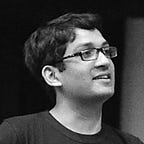Discovering Dr Ambedkar
Tucked away in the corner of a leafy Dadar neighbourhood lies the final home of one of the founders of the Indian Republic, Dr B. R. Ambedkar. Like many of India’s revolutionary founders, today he is known as a political symbol, a champion of the oppressed, with his suited, bespectacled portrait with tightly combed hair ubiquitous in government offices and outside informal housing colonies. For many modern, privileged Indians, Ambedkar is infamous for bringing in affirmative action into India with “reservations” being a curse for young and meritorious students who are asked to move aside for preferences given in jobs and education to people from traditionally oppressed communities.
Rarely do we know the person behind the portrait. Few Mumbaikars know that he finally “settled down” in the city and built his house in a quiet corner away from the hustle and bustle of the city. A random discussion at Frappe, turned into an evening trip to his home in Dadar. At Frappe we aspire to be a “democratic” company, and there is no better inspiration than paying our respects by visiting the home of the person who is known as the father of the Indian Constitution, her first Law Minister, and has been influential in the way it has shaped Indian society.
While I floated the idea, I wasn’t sure how many people would sign up for this small excursion into history — which happened to be just a 20 minute train ride away from our office. A few people did show enthusiasm and that was all that was needed to convince the rest of us to come along. The dozen odd of us who were in office on Friday evening, decided to shut down early and be there before the closing time at the Museum. A 20 min walk from Matunga station brought us to the gate of the white mansion with an unambitious, yet imposing facade called Rajgruha.
Rajgruha is still the home of the Ambedkar family and they have converted part of the ground floor into a museum. It is a very small museum that showcases some of the artifacts used by Dr Ambedkar, his study, his name plate, meeting room, his deathbed and a small Buddhist temple. Littered with some of his books, an early print of the Indian Constitution. There were very few visitors other than us and the museum guide was happy to give us a personalised tour. The only other visitors were a visibly poor, malnutritioned family who seemed like they had come from the village, the kind that seems forgotten in the bustle of the city, for whom the visit was more a pilgrimage than a tour.
The guide was clearly excited to see young urbane people like us as he explained the life and achievements of Dr Ambedkar. What was striking to me is that his speech was very “politically correct” for the times we live in. His explanation of why Ambedkar renounced Hinduism and embraced Buddhism was almost apologetic, and his attempt to portray Ambedkar as a nationalist icon who did a lot of work for “development” (infrastructure) as a part of the constitution. Later I went and read up that Ambedkar was a highly acclaimed economist as well. He was the first Indian to get a doctorate in economics from outside India (Columbia). Considering myself as a well educated Indian, I was humbled to know how little I knew about Ambedkar.
Later we had our snacks and coffee at one of the famous idli houses of Matunga and strolled our way towards five gardens to wrap off the evening. We sat on the grass and chatted about mundane things feeling generally happy about the way things are.
—
Reflecting later about the visit pushed me to learn more about Ambedkar himself. His Annihilation of Caste speech makes for powerful reading (PDF). Ambedkar was a failed politician but he was successful in bringing social justice to the table when India became an independent republic. More than just a political leader, he was a powerful intellectual, activist and social reformer. He believed that political equality was less meaningful without social and economic equality and hence created the conditions to make India a slightly more socially equal place.
During our 15 years at Frappe, though we have never taken a formal census, my hunch is that less than 3% of our hires have been from socially backward communities. I am pretty sure this is not because there is any bias in hiring, but because so few people from these communities apply for jobs like the ones we have. It means that this vision of social and economic quality is still incomplete. Sadly, in a time where politics is more defined on religious lines, caste and class divides are getting ignored. So is Dr Ambedkar’s legacy, much like the legacies of the liberal founders of our republic.
Dr Ambedkar’s ideas are so powerful that I don’t think they can remain ignored for long. Treating fellow humans as equals and caring for those left behind is as natural as being cruel and heartless to others. There is no question in which society most of us want to live. We are lucky to have people like Dr Ambedkar show us the way. I hope his ideas inspire us at Frappe to be more responsible and caring.
